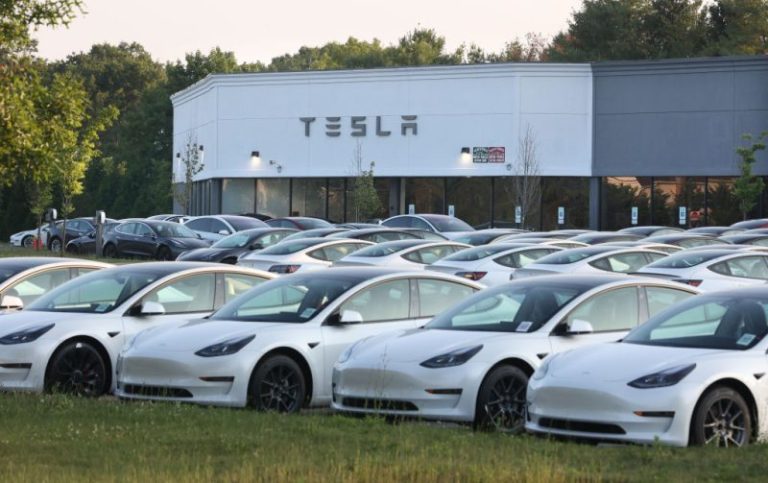ALBANY, N.Y. (NEXSTAR) — New York lawmakers proposed two bills from different directions, but both related to electric vehicles at Elon Musk’s Tesla. One, from Republicans, on political vandalism, and the other, from Democrats, to boost competition in the electric vehicle market.
State Senator Mark Walczyk introduced S7271 on April 7. It doesn’t yet appear to have a bill number in the Assembly, but will be carried by Assemblymember Chris Tague. The bill adds “suppression or promotion of a political ideology”—damaging private property to promote or suppress a political ideology—to New York’s property damage laws.
That measure follows nationwide reports of Tesla owners, dealerships, and charging stations being vandalized. Walczyk and Tague said that targeting property in response to the political views of Tesla CEO Elon Musk has added a dangerous layer to disagreements about political ideas.
‘Molotov cocktails and firearms’ used in attack at Las Vegas Tesla center, police say
Neither legislator could point to an example of violence against a Tesla or Tesla owner for political reasons in their own districts. But, “There definitely have [been attacks on Teslas] in New York State,” Walczyk said.
The bill would make keying or defacing a Tesla a crime, third-degree criminal mischief, a Class E felony that potentially carries a one- to four-year prison term. The Republican legislators held a press gaggle in the New York State Capitol to explain that the measure gives prosecutors a new tool against criminal behavior.
Asked about the proposal on Thursday, Hochul said she was focused on the budget and would consider the bill if it advances through the legislature.
In late March, State Senator Patricia Fahy and Assemblymember Gabriella Romero launched a separate bill to open the electric vehicle market to new players. The Democratic legislators’ proposal—S6894 in the Senate, with no bill number in the Assembly so far—would make New York’s Department of Motor Vehicles review old direct-sale certificates, and only issue new ones to zero-emission vehicle makers that haven’t held that certificate already. Essentially, the bill prevents the state from granting permanent rights to early entrants in the market.
The bill maintains the current cap of five direct sales locations in the state, ending renewals for vendors who’ve already been awarded sales certificates. As of today, Tesla holds all five spots downstate. Fahy has said that bringing new manufacturers into the market will increase competition and affordability by weakening Tesla’s monopoly on direct zero-emission vehicle sales in New York.
Fahy noted that Tesla sales have dropped in New York and that the current system limits choice. This bill builds on her apparent anti-Tesla efforts. She already supports divesting the state pension fund from Tesla and blocking new Tesla dealerships in her district. The freshman senator with years of Assembly experience has carried previous versions of this bill in the Assembly since 2021.
Walczyk also previously supported that legislation in the Senate. On Thursday, he addressed that overlap:
New York has a stated goal of 100% zero-emission new vehicle sales by 2035, according to the state’s Climate Leadership and Community Protection Act, as Walczyk said.
Both Republican legislators insisted that their legislation doesn’t shield the controversial Musk—who heads President Donald Trump’s Department Of Government Efficiency—but shields New Yorkers from violent political speech. Still, “If you’re listening, Elon,” Tague said, “there are a number of us here in New York who actually have your back.”
What is Turo? Car rental app used in New Orleans and Las Vegas
When asked, Walczyk and Tague declined to address problems at the Tesla factory in Buffalo. According to Democratic State Sen. Sean Ryan—running for mayor of Buffalo—the troubled plant doesn’t pay taxes, giving the state just $1 a year to lease from the state. New York paid some $900 million to build the factory back in 2014.
Both bills now head to committee, where lawmakers will debate their likely merits and impacts.

